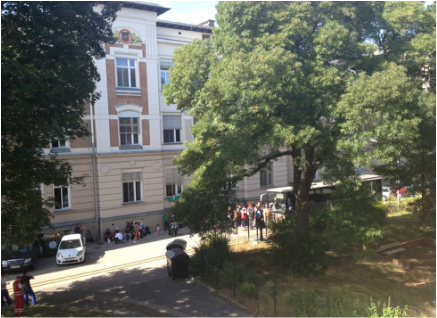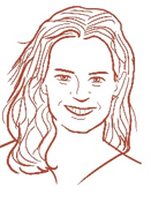
Managing such an influx of people is challenging at the best of times, and particularly given the refusal to prepare we have seen around Europe. Some countries, such as Austria and Germany, have made considerable progress nevertheless. Moreover, in Austria and beyond, the support provided by NGOs, civilians as well as some public and private institutions, including the armed forces, has been enormous (and, for some, surprising). Many would argue that volunteer support is what has kept the refugee crisis from turning into a disaster so far.
When arriving at the former hospital that had been converted into a refugee shelter I expected that someone would be in charge and assign me a role, perhaps even one that provided a reasonable fit with my skill set. Instead, I encountered mostly chaos. All I was told was that a large group of refugees had arrived a few hours before, just as another large group of refugees was picked up – with very little notice. There was no hard data on the current group’s nationalities, gender ratio, how they had got to Austria, or what their ordeal had been until then. While I would normally have frowned upon such an apparent lack of organisation and overview, it quickly became clear that given the degree of uncertainty about refugee movements in general, the unfolding crisis of Europe and the fact that most ‘helpers’ are volunteers – there was no other way, and it was pretty effective (I'll write more about life at the shelter in another post).
After what many refugees would have experienced recently, I assumed that some of them might be tempted to stay a night or two, given the availability of beds, hot showers, clean clothes, food, medical treatment and a safe place for children to play. However, most of them seemed to have just one question on their minds: how can we get to Germany?
Having identified a young Afghan who spoke excellent English I quickly found myself encircled by a number of young Syrian and Afghan men (who had come either alone or with their families). They kept asking about getting to Germany and made it clear that they had no time to lose. In providing an answer I wanted to do justice to the complexity and uncertainty of the situation while being straightforward enough not to confuse them any further. Under normal circumstances, the answer would have been easy: take a tram or taxi to the station, hop on the next train, and you’re there in just a few hours, no document check involved. This may have been true even now, but we simply had no way of knowing under the current circumstances and given the constantly changing border scenarios and enormous information gap. At the same time, we were told there was a good chance the Austrian armed forces would send buses to the shelter to take people straight to the border. We just didn’t know when they would come, or whether they would come at all. In other words, we could not be sure of anything, and I certainly did not want to raise false hopes among refugees. No, we cannot promise you that police won’t be there when you get to the border. And no, we cannot promise you there will be room for everyone on the buses, should they come. But yes, you are free to leave the building if you want, we are not keeping you, we are not a prison. The latter statements came as a big surprise to many, as did the fact that Austria is a safe and wealthy country where they could register and may be granted asylum, just as in Germany. In fact, some were not even sure which country they were in, nor what to associate with Austr(al)ia.
The buses came, and most refugees got on. I have no idea where the Afghan and Syrian men, women and children I met are now. Hundreds of new refugees have arrived at ‘my’ shelter. I have been back and I hope I’ll find time to volunteer again. While I cannot know what to expect (this includes the possibility of turning up and finding the shelter almost empty – this has happened before), I’m certain that I’ll always learn something new. Not having hard data, or even reasonable anecdotal evidence about key parameters, is a reality of this crisis as it unfolds. What has become very clear is that the lack of information makes dealing with the crisis difficult on both ends – from the refugees’ perspective as much as for those who want to help.
I just hope that people’s dreams won’t be shattered if and when they arrive in Germany. Many refugees may be more optimistic about being granted a right to stay and work than is warranted. Perhaps the current lack of unbiased information is a good thing after all – it may have helped the luckier ones focus on their goal, and reach it; one step, one country at a time. Let’s just hope it will have been worth their ordeal.

 RSS Feed
RSS Feed